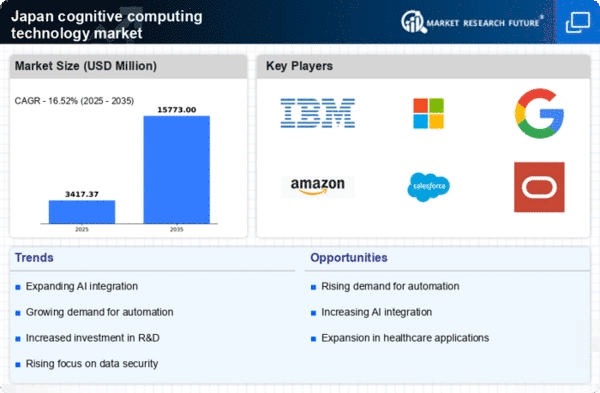Rising Adoption of Smart Assistants
The cognitive computing-technology market in Japan is witnessing a notable rise in the adoption of smart assistants across various sectors. These AI-driven tools are being utilized to enhance customer service, streamline operations, and improve user experiences. By 2025, it is anticipated that the market for smart assistants will grow by approximately 30%, driven by consumer demand for personalized interactions. Businesses are increasingly leveraging cognitive technologies to create more engaging and efficient customer interactions, thereby positioning themselves favorably in a competitive market. This trend underscores the importance of cognitive computing in shaping the future of customer engagement.
Growing Demand for Enhanced Data Analytics
The cognitive computing-technology market in Japan is experiencing a surge in demand for advanced data analytics solutions. Organizations are increasingly recognizing the value of data-driven decision-making, which is leading to a greater reliance on cognitive technologies. In 2025, the market for data analytics in Japan is projected to reach approximately $5 billion, reflecting a compound annual growth rate (CAGR) of around 15%. This growth is driven by the need for businesses to derive actionable insights from vast amounts of data. As companies seek to improve operational efficiency and customer engagement, the cognitive computing-technology market is positioned to play a pivotal role in transforming data into strategic assets.
Increased Focus on Cybersecurity Solutions
As cyber threats continue to evolve, the cognitive computing-technology market in Japan is experiencing an increased focus on cybersecurity solutions. Organizations are recognizing the need for advanced cognitive technologies to protect sensitive data and maintain operational integrity. By 2025, the market for AI-driven cybersecurity solutions is projected to grow by 25%, driven by the rising frequency of cyberattacks. This trend highlights the importance of cognitive computing in developing proactive security measures, enabling businesses to safeguard their assets while navigating an increasingly complex digital landscape.
Integration of AI in Manufacturing Processes
The integration of artificial intelligence (AI) into manufacturing processes is significantly influencing the cognitive computing-technology market in Japan. As the country aims to enhance productivity and reduce operational costs, manufacturers are increasingly adopting cognitive solutions. In 2025, it is estimated that AI-driven technologies could contribute to a 20% increase in manufacturing efficiency. This trend is particularly relevant in sectors such as automotive and electronics, where precision and speed are paramount. The cognitive computing-technology market is thus becoming essential for manufacturers looking to maintain competitiveness in a rapidly evolving landscape.
Government Initiatives Supporting AI Development
Government initiatives in Japan are playing a crucial role in fostering the growth of the cognitive computing-technology market. With a focus on innovation and technological advancement, the Japanese government has launched several programs aimed at promoting AI research and development. In 2025, public funding for AI initiatives is expected to exceed $1 billion, reflecting a commitment to establishing Japan as a leader in cognitive technologies. These initiatives not only support startups and established companies but also encourage collaboration between academia and industry, thereby enhancing the overall ecosystem for cognitive computing.
















